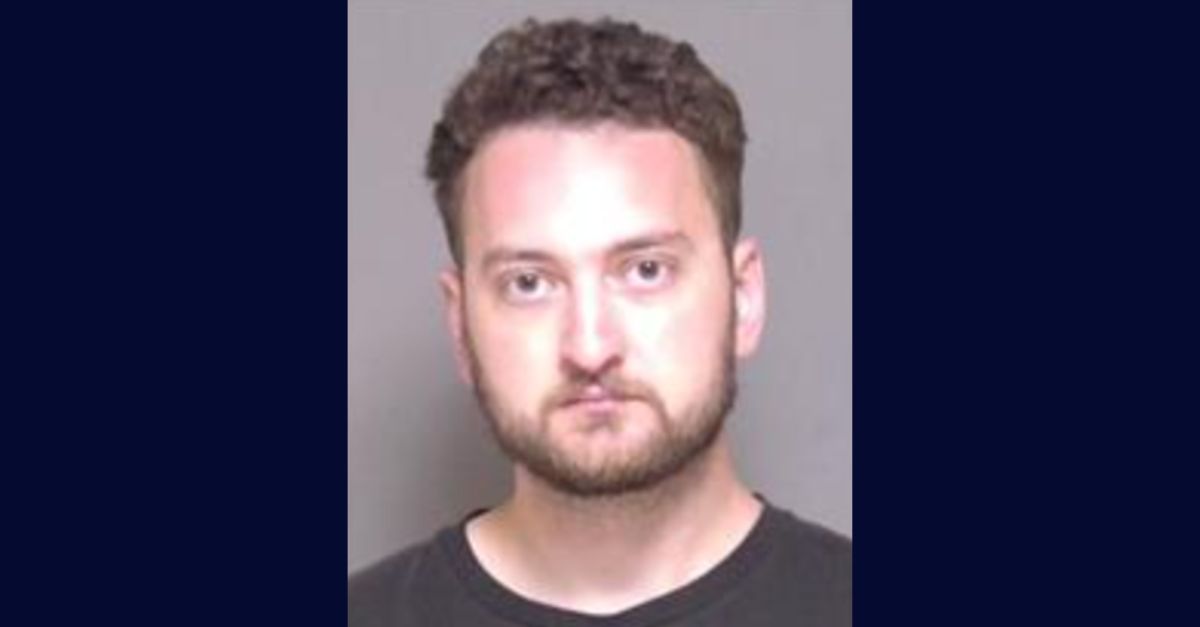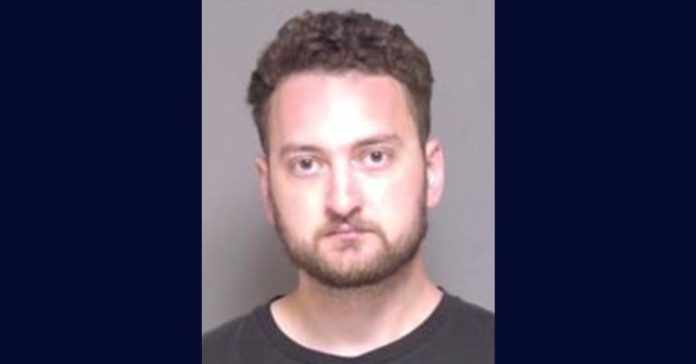
Dr. Connor Bowman is accused of using to the drug colchicine to fatally poison his wife in Minnesota, according to authorities. (Rochester Police Department)
Authorities in Minnesota say a doctor who worked as a poison control specialist fatally poisoned his wife as they were considering a divorce because of infidelity, an arrest affidavit said.
Dr. Connor Fitzgerald Bowman, 30, is facing a second-degree murder charge in the death of his wife, 32-year-old Betty Bowman. He was arrested Friday during a traffic stop in Rochester, about 90 miles south of Minneapolis.
Betty Bowman died at a hospital on Aug. 20 following a four-day stay with severe diarrhea and severe dehydration which “deteriorated rapidly.” Doctors initially treated her for food poisoning but that didn’t take. She began to experience cardiac issues, fluid in her lungs and organ failure. Betty Bowman was considered a healthy person before her hospital admission, investigators said.
Her husband suggested to others and in her obituary that she suffered from hemophagocytic lymphohistiocytosis or “HLH,” which is a rare illness where certain blood cells build up and damage organs. Tests were done for HLH, but they were inconclusive, police said.
The day after she died, the Southeast Minnesota Medical Examiner’s Office alerted the Rochester Police Department about a suspicious death. The office had prevented a cremation from taking place due to the suspicious circumstances.
Connor Bowman had told the medical examiner’s office that his wife should be “cremated immediately” because her death was natural. But according to the medical examiner, it received a call from a woman who knew the Bowmans who said the couple was having marital issues and “talking about a divorce following infidelity and a deteriorating relationship,” the affidavit said.
The doctor emailed death investigators at the medical examiner’s office asking if toxicology reports that were being completed were more “thorough” than what would typically be done at a hospital, the affidavit said. He also asked for a list of what would be tested.
Connor Bowman had attended pharmacy school and worked in poison control in Kansas and was currently in medical school. A spokesperson from the Mayo Clinic said in a statement to Law&Crime that his residency at the hospital had just finished earlier this month.
“We are aware of the recent arrest of a former Mayo Clinic resident on charges unrelated to his Mayo Clinic responsibilities,” the statement said. The hospital would not comment further.
Betty Bowman had recently told others that her husband was in debt so they kept separate bank accounts. Connor Bowman told a friend he was going to receive a $500,000 life insurance policy as a result of his wife’s death.
A detective spoke with a man only identified in the affidavit as “SS.” He said in the interview with detectives that Betty Bowman on Aug. 14 told him she “had a few days off work and was looking to spend some time with him.” The two saw each other the next day and texted later that night while she was drinking with her husband at home.
On Aug. 16, she told him she was so sick she could not sleep at all. She said she thought it may have been an alcoholic drink that she had that caused her illness because it was mixed in a large smoothie, the affidavit said.
Detectives later learned that Connor Bowman had accessed his wife’s electronic health information at the hospital by using his medical credentials while she was at the hospital and again a few days after she died. The information included admission information, reviewed notes, medications, allergies and an operating room log, according to the affidavit.
Investigators also seized a University of Kansas laptop that the defendant used as a poison control specialist, which he apparently worked remotely. He worked the job on Aug. 5, 6 and 10. As part of his job, the university gave him a computer so he could look up drug information while answering calls. An examination of his computer showed he completed internet searches and research about the drug colchicine, which is used to treat gout — a condition that causes intense pain in your joints. Neither Bowman nor any other employees working at that time received any calls about gout or colchicine, the affidavit said.
Connor Bowman on Aug. 5 allegedly searched “internet browsing history: can it be used in court?,” “police track package delivery” and “delete Amazon history police.” On Aug. 10, he searched “food v. industrial grade sodium nitrate.” He also looked up a journal used by several medical professionals to search the lethality of substances, the affidavit states. He converted his wife’s weight to kilograms and multiplied it by 0.8, which is considered the lethal dosage for colchicine, investigators wrote.
In the days that followed, Connor Bowman searched how to buy colchicine and allegedly bought gift cards to a website that sells the drug, police said.
Investigators sent Betty Bowman’s blood samples taken while she was in the hospital to the Minnesota Department of Health, which concluded colchicine was present in her system. The level on Aug. 17 was 29 ng/ML which is considered elevated. Investigators also noted that the drug, which the medical examiner said metabolizes quickly, should not have been in her body because she didn’t have any symptoms that would cause doctors to give her the drug.
The medical examiner determined the cause of death to be the toxic effects of colchicine and the manner of death to be a homicide. A search of the couple’s home after Connor Bowman’s arrest turned up a $450,000 bank deposit note, according to the affidavit.
Betty Bowman’s obituary — which features a picture of her and her husband — said she was born in Wichita, Kan. and graduated from the University of Kansas School of Pharmacy with a pharmaceutical doctorate in 2018. The couple married on May 30, 2021. She worked as a “diligent and capable hospital pharmacist” while her husband went through his internal medicine residency, the obit said.
“Her kindness and intelligence was noticed and valued by friends and strangers alike,” the obit said.
Connor Bowman is now at the Olmsted County Jail. His attorney could not be reached by Law&Crime for comment.
Have a tip we should know? [email protected]

